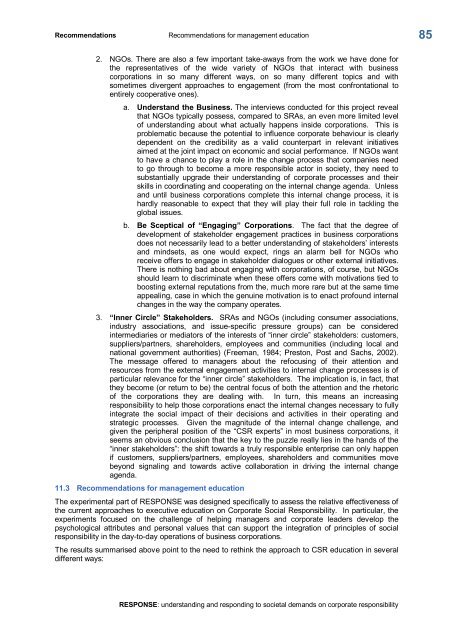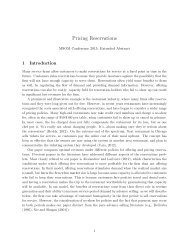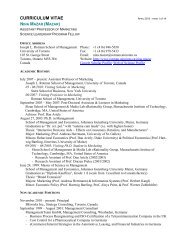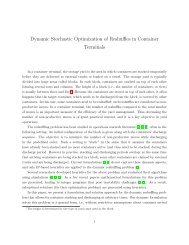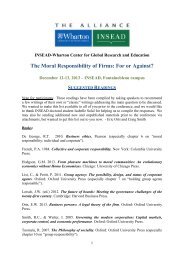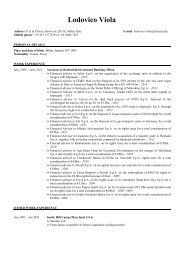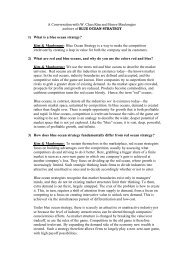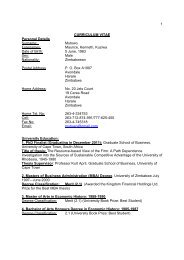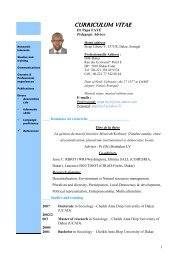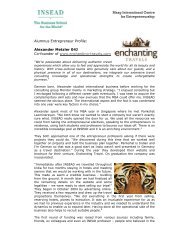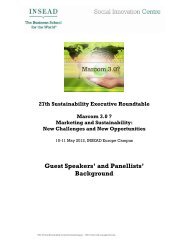RESPONSE - Insead
RESPONSE - Insead
RESPONSE - Insead
Create successful ePaper yourself
Turn your PDF publications into a flip-book with our unique Google optimized e-Paper software.
Recommendations Recommendations for management education<br />
2. NGOs. There are also a few important takeaways from the work we have done for<br />
the representatives of the wide variety of NGOs that interact with business<br />
corporations in so many different ways, on so many different topics and with<br />
sometimes divergent approaches to engagement (from the most confrontational to<br />
entirely cooperative ones).<br />
a. Understand the Business. The interviews conducted for this project reveal<br />
that NGOs typically possess, compared to SRAs, an even more limited level<br />
of understanding about what actually happens inside corporations. This is<br />
problematic because the potential to influence corporate behaviour is clearly<br />
dependent on the credibility as a valid counterpart in relevant initiatives<br />
aimed at the joint impact on economic and social performance. If NGOs want<br />
to have a chance to play a role in the change process that companies need<br />
to go through to become a more responsible actor in society, they need to<br />
substantially upgrade their understanding of corporate processes and their<br />
skills in coordinating and cooperating on the internal change agenda. Unless<br />
and until business corporations complete this internal change process, it is<br />
hardly reasonable to expect that they will play their full role in tackling the<br />
global issues.<br />
b. Be Sceptical of “Engaging” Corporations. The fact that the degree of<br />
development of stakeholder engagement practices in business corporations<br />
does not necessarily lead to a better understanding of stakeholders’ interests<br />
and mindsets, as one would expect, rings an alarm bell for NGOs who<br />
receive offers to engage in stakeholder dialogues or other external initiatives.<br />
There is nothing bad about engaging with corporations, of course, but NGOs<br />
should learn to discriminate when these offers come with motivations tied to<br />
boosting external reputations from the, much more rare but at the same time<br />
appealing, case in which the genuine motivation is to enact profound internal<br />
changes in the way the company operates.<br />
3. “Inner Circle” Stakeholders. SRAs and NGOs (including consumer associations,<br />
industry associations, and issuespecific pressure groups) can be considered<br />
intermediaries or mediators of the interests of “inner circle” stakeholders: customers,<br />
suppliers/partners, shareholders, employees and communities (including local and<br />
national government authorities) (Freeman, 1984; Preston, Post and Sachs, 2002).<br />
The message offered to managers about the refocusing of their attention and<br />
resources from the external engagement activities to internal change processes is of<br />
particular relevance for the “inner circle” stakeholders. The implication is, in fact, that<br />
they become (or return to be) the central focus of both the attention and the rhetoric<br />
of the corporations they are dealing with. In turn, this means an increasing<br />
responsibility to help those corporations enact the internal changes necessary to fully<br />
integrate the social impact of their decisions and activities in their operating and<br />
strategic processes. Given the magnitude of the internal change challenge, and<br />
given the peripheral position of the “CSR experts” in most business corporations, it<br />
seems an obvious conclusion that the key to the puzzle really lies in the hands of the<br />
“inner stakeholders”: the shift towards a truly responsible enterprise can only happen<br />
if customers, suppliers/partners, employees, shareholders and communities move<br />
beyond signaling and towards active collaboration in driving the internal change<br />
agenda.<br />
11.3 Recommendations for management education<br />
The experimental part of <strong>RESPONSE</strong> was designed specifically to assess the relative effectiveness of<br />
the current approaches to executive education on Corporate Social Responsibility. In particular, the<br />
experiments focused on the challenge of helping managers and corporate leaders develop the<br />
psychological attributes and personal values that can support the integration of principles of social<br />
responsibility in the daytoday operations of business corporations.<br />
The results summarised above point to the need to rethink the approach to CSR education in several<br />
different ways:<br />
<strong>RESPONSE</strong>: understanding and responding to societal demands on corporate responsibility<br />
85


